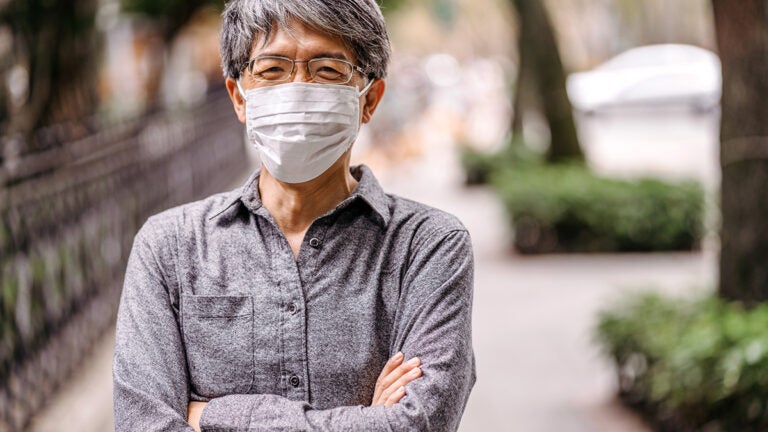
Course uses the COVID-19 pandemic as a window into anti-Asian racism in the US
“The Wuhan virus,” “the Chinese virus,” travel restrictions and violence targeting Asian communities in the United States: The COVID-19 pandemic has brought with it a flood of racism against Asians and Asian Americans. The advocacy group Stop AAPI Hate logged 3,800 self-reported racist incidents against Asian Americans over the past year. Further, one in four Asian youths reported having experienced racist bullying in the wake of the pandemic.
But the recent anti-Asian sentiment in America is only the latest installment in a history of racism against people from Asia that includes discrimination leveled at Chinese railroad workers in the 19th century and the incarceration of Japanese Americans during World War II.
“In the United States and beyond, this catastrophe has been going on for hundreds of years, and COVID-19 is only one manifestation of it,” says Adrian De Leon, assistant professor of American studies and ethnicity.
The pandemic’s place in this context of racism was the central topic of De Leon’s fall 2020 course “The Making of Asian America” (AMST 220), in which students looked at issues such as assimilation, language and accents, post-slavery Chinese labor, and SARS, and how each item represented a facet of anti-Asian behaviors and stereotypes in the U.S.
Since joining USC Dornsife in 2019, De Leon has taught about Asian, particularly Filipino, labor and culture in North America and serves on the steering committee for the Center for Transpacific Studies. He has been vocal in calling for Asian communities to work together and with other underserved communities to work for equal rights and a collective well-being. He developed “The Making of Asian America” as a way to help students develop literacies in anti-racism and social justice.
“I just want to provide a space for them to question the fundamental assumptions of racism and anti-racism, and I want them to ask some very fundamental, life-changing questions. Predominantly for a lot of my students, the life-changing question for them is, ‘What can I do?’” De Leon says.
“I love Chinese food!”
Each week of the course focused on a particular microaggression toward Asian Americans in the U.S., from statements such as “take your Chinese virus back home to china” to stereotypical beliefs that Asian Americans are hard workers, have tasty food or are highly intelligent.
Though the latter sentiments may seem positive on the surface, when Americans say they like Chinese food or a K-pop group, there may be deeper feelings of anti-Asian racism at work, De Leon points out.
Tiffany Wong, a student in De Leon’s class who graduated in December 2020 with a bachelor’s degree in journalism and East Asian languages and cultures, adds that trying to conform to popular stereotypes is damaging to Asian Americans.
“I think the stereotype is Asian Americans kind of keep to themselves. They are the model minority,” she says. “They’re nice and quiet and docile. And so just having the space to speak our feelings — whether they’re angry, frustrated, sad — it’s just so healing, I think.”
De Leon says he organized the class by microaggression because the daily language used to speak of race in the U.S. is very microaggression-based.
“I wanted to use these microaggressions as … ways to get students to situate themselves in terms of their language, their politics, how they go about their daily life. And a lot of students just said, ‘Oh my God, yeah, that is a racist thing. I didn’t quite realize it,’” he says. “And so, to understand COVID-19 and to understand the blatant, vulgar racism, we have to understand it in terms of its polite manifestations.”
The podcast experience
For their final project, students produced 15- to 20-minute podcasts, which often included interviews, on topics pertaining to Asian American politics in 2020. De Leon arranged for video journalist and filmmaker Dolly Li to listen to the students’ work and give them feedback.
“The podcasts were awesome. I had one student do Asian American appropriation of Blackness and anti-Blackness in the community. I had another student group do Vietnamese American Trump voters,” he says. “It was really cool, very multi-varied,” De Leon says.
Wong, currently a news assistant tracking COVID-19 at The New York Times, said the exercise and the feedback were helpful in terms of teaching her career skills.
“It really helps me as a journalism student think more about what kinds of sources I should include or other voices I could have included,” she says. “I had never done a podcast before, and journalism is all multimedia now, so it was really nice to be able to make a project that is applicable and useful and publishable outside of the class as well.”
Dylan Locke, a senior majoring in theatre at the USC School of Dramatic Arts, said creating his podcast deepened his relationship with his father, a second-generation Asian American. Locke spoke to his dad about his experiences growing up in the U.S. in the 1960s.
“His second-grade teacher would ask everyone what they had for breakfast. If it was anything that wasn’t the traditional eggs-and-bacon American fare, they would get their hands slapped with a ruler,” he says.
“To be able to have these sort of discussions and revelations of our own discoveries in talking with friends and family and loved ones. It was such a thrilling way to end this semester, honestly.”
De Leon plans to teach the course again in spring 2022.
Michelle Boston contributed to this story.